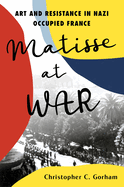
During World War II, the French modernist artist Henri Matisse and his family remained in France, in defiance of the Nazi occupation, as Christopher C. Gorham reveals in the illuminating Matisse at War. By 1940, Matisse had made his home in Nice for 15 years, but when the Germans invaded France that year and took Paris, Nice became a "sliver of noisy normality between the Vichy state and Mussolini's Italy." Here, "Matisse tried to cope with the personal and national crises by creating." Gorham's insightful analysis of Matisse's works during the war are enlightening and his descriptions of Matisse's children and ex-wife and their roles within the French resistance emotionally ground the narrative. Even though Matisse and his wife, Amélie, separated in 1939, she protected his artwork from Nazi confiscation. His daughter, Marguerite, was imprisoned and severely tortured for her resistance work.
Gorham also sheds light on the bond between Matisse and Pablo Picasso, the "two giants of modernism" who "waged an elegant and knightly war" over their artistic beliefs. This is a free-flowing work that does not focus solely on Matisse (who was bedridden most of the time), but on friends, relatives, and other artists who chose to stick it out in France. Gorham argues that Matisse's life in Nice was not a deliberate escape from war, because "his whole family was separated" by the conflict. Matisse at War is an engaging tale of art and war. -- Peggy Kurkowski, book reviewer in Denver

